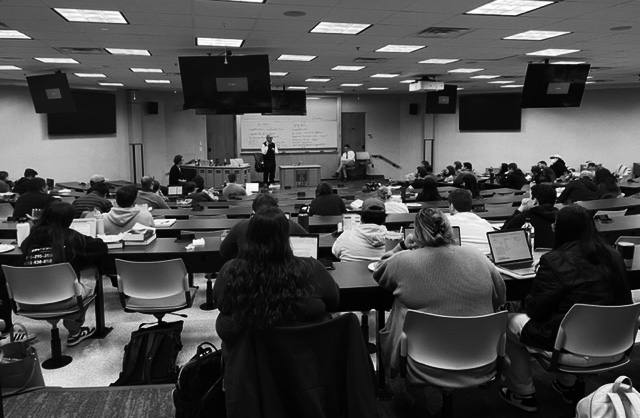On March 28th, first year law students crowded into a Klein lecture hall to learn about potential course offerings in business law (and eat some free pizza). The event, hosted by the Temple 10-Q, featured a panel of both professors and students providing guidance on course selection based on firsthand experience. Professors Lipson, Monroe, and Broder represented the business law faculty while Jackie Dansak, Josh Meyerson, Fleur de Jong, Stephanie Creech, and Landon Farnsworth spoke for the upper-level students.
For many 1Ls, the course selection process can feel overwhelming. While courses and professors are chosen for students in their first year, making these decisions falls entirely on the students’ shoulders in their second year. Students must determine what courses they would like to take, when, with what professors, and how to prioritize their selections. Hearing from both students who have been through the process and professors who are experts in their own subject matter can be immensely helpful.
Professor Monroe began by advising students to consider the doctrinal courses required for a Certificate in Business Law, Corporations and Tax. Students must also take additional business law electives, which they can tailor to their individual interests and strengths. Although not necessary, a Certificate in Business Law can be a helpful way to signal to employers that a student is serious about their interest in business law and has put in the work to develop their expertise.
Beyond fulfilling the foundational requirements, students should aim for a balanced schedule with exam, experiential, and writing courses to build foundational knowledge and skills necessary to enter the workforce. Jackie Dansak, a fourth-year evening student, discussed how courses like Securities Regulation and Mergers & Acquisitions served her immediately while interning at a transactional firm this year.
Other students expanded on this thought, noting that simulation-based classes like Lawyering for Entrepreneurship and the Integrated Transaction Program (“ITP”) can also be incredibly useful in developing skills necessary to be successful in practice. Professor Lipson has worked within the law school to ensure student’s gain this hands-on experience, developing a specialized course, Lawyering for Entrepreneurship, to help students understand what the legal side of running a start-up looks like.
Professor Broder advised students through the lens of an experienced trainer, manager, and hirer of business lawyers. As the former general counsel of Conrail, Professor Broder knows how crucial it is to hire young attorneys ready to hit the ground running—employers now expect productivity on day one. With this in mind, he suggests that students consider how they can build practical experience while still in school. Many courses are focused on developing skills to use in the workplace, like competency in project management and basic business and financial concepts. Even if a student chooses not to practice as a lawyer in the future, these foundational skills gained from a legal education can be incredibly helpful in the business world.
Student panelists and professors alike also stressed that students need not make a decision between a litigation or transactional path. As a bankruptcy practitioner, Professor Lipson knows all too well that the lines between transactional work and litigation can be extremely blurry. In her practice as a tax attorney, Professor Monroe could not recall a single deal which did not plan for the possibility of litigation or a contentious audit. On the flipside of the same coin, litigators must understand business law concepts in order to be successful in their roles. Gaining expertise in both areas can serve attorneys no matter what path they ultimately pursue.
Understandably, a lot of 1Ls might be overwhelmed by the many opportunities presented to them. Between practicums, guided research, traditional courses, and internships, the possibilities seem endless, but students should always remember they are not alone in the decision. Professors, upper-level students, and administrators are all available to impart their years of wisdom and help plan out scheduling not just for the next semester, but for the entirety of your law school career. If interested in a specific subject, students should reach out to that appropriate department to chat about their goals and how best to accomplish them. Alternatively, the wonderful panelists all offered up their time to speak with students about their course selections in the year to come.
BIO: Therese Gildea (LAW ’23) is a Novel Content Editor for the Temple 10-Q.
